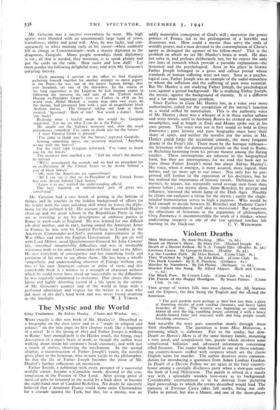The Mystic and the World
Grey Eminence. By Aldous Huxley. (Chatto and Windus. 155.) WHAT exactly is this new book of Mr. Huxley's? Described as a biography on the dust cover and as a "study in religion and politics " on the title page, its first chapter reads like a fragment of a novel. It is the spring of 1625 and Father Josepn is walking to Rome: here immediately is the Huxley touch, the biting, exact description of a man's brain at work, as though the author were walking about inside his creature's head, curiously, and with just a touch of malice, observing the mechanism. In the second chapter, a reconstruction of Father Joseph's yowl, the novelist gives place to the historian, who in turn yields to the philosopher. So that the life of Father Joseph becomes the pivot of Mr. Huxley's further reflections on mysticism.
Father Joseph, a nobleman with every prospect of a successful worldly career, became a Capuchin monk, devoted to the con- templation of the Passion of Our Lord. After giving proof of mystical gifts he returned to the world by a back door to become the right-hand man of Cardinal Richelieu. No doubt he sincerely believed that a dominant France could alone unite Christendom for a crusade against the Turk, but this, for a mystic, was an
oddly materialist conception of God's will ; moreover the power politics of France led to the prolongation of a horrible and disastrous war. How could a mystic thus serve the ends of worldly power, and a man devoted to the contemplation of Christ's agony so disregard the agonies of his fellow-men? This is the problem on which we see Mr. Huxley's brain at work. He does not solve it, and perhaps deliberately not, for he rejects the only two lines of research which provide a passable explanation—the historical and the psychological. Seen in his place in history Father Joseph belonged to a gross and callous period whose standards of human suffering were not ours. Seen as a psycho- logical case, Father Joseph was an example of the sadist-masochist to whom the infliction and the suffering of pain were essential. But Mr. Huxley is not studying Father Joseph, the psychological case, against a period background. He is studying Father Joseph, the mystic, against the background of eternity. It is a different and a far more important problem.
Since Eyeless in Gaza Mr. Huxley has, in a voice ever more authoritative, called for the recognition of the mystic's function in a world stifled by materialism. This is the authentic voice of Mr. Huxley ' • there was a whisper of it in those earlier urbane and witty novels, until in Anthony Beavis he created an eloquent mouthpiece, and at length in Ends and Means spoke out in his own person. The voice may not at first sound so bold in Grey Eminence ; pure history and pure biography .must have their share of space, and neither the novelist nor the artist in Mr. Huxley could forgo the occasional comedy, the more frequent drama of the Friar's life. There must be the baroque tableaux— the horseman with the damascened pistols on the road to Rome, or Richelieu hastening from his private theatre among the flaring torches. These interruptions are inherent in the biographical form, but they are interruptions, for we read this book not to learn about Father Joseph's mind but about Aldous Huxley's. His voice, when it emerges, is more assured, more logical, than before, and yet more apt to our times. Not only has he pro- gressed still further in the exposition of his doctrines, but he has realised the importance of historic proofs. Deference to the mystics, he argues, has repeatedly saved average men from their grosser follies ; one mystic alone, Saint Benedict, by precept and influence, leavened the whole lump of the Dark Ages. Possibly he claims too exclusive a virtue for the mystic ; surely the single- minded humanitarian serves as high a purpose. Who would be bold enough to decide between St. Benedict and Madame Curie? Or is single-mindedness itself akin to mysticism? But whatever the objections of historians or the arguments of philosophers, Grey Eminence is incontroVertibly the work of a thinker, whose
ffe undeviating integrity is o of the few spiritual torches left






















 Previous page
Previous page